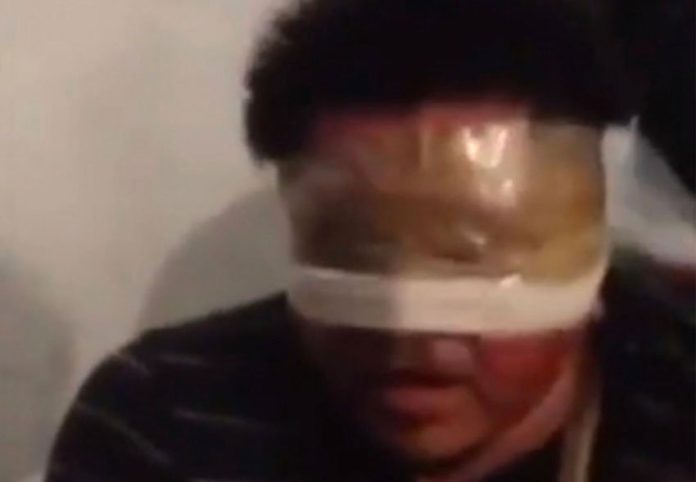The legitimacy of the federal government’s version of the 2014 disappearance of 43 students in Iguala, Guerrero, was once again called into question yesterday when a video showing the torture of a suspect was published on YouTube.
It also cost the undersecretary of security in Michoacán his job — he is allegedly the interrogator in the video.
The torture victim, identified as Carlos Canto, is seated with his eyes blindfolded and his hands bound. Behind him, a man in a federal Attorney General’s Office uniform interrogates Canto, repeatedly asking him about the events that took place in Iguala the night the students disappeared.
Near the end of the video, the police officer behind Canto places a plastic bag over his head and pulls it tight, cutting off the man’s oxygen.
The video confirms a report published by the United Nations in March 2018 that found that 34 people were tortured in connection with the investigation of the students’ disappearance, including “beatings, kicks, electric shocks, blindfolding, attempted asphyxia, sexual assault and various forms of psychological torture.”
Based on the United Nations’ findings, a federal judge ruled last November that the statements upon which the findings were based were obtained illegally in violation of detainees’ human rights and must be dismissed. Following the ruling, three men who had previously been accused of being the actual perpetrators of the crime were released from custody.
From early in the investigation the government’s version has been widely questioned both within Mexico and internationally. Many believe that the army might also have been involved in the students’ disappearances.
Carlos Canto, the man in the video, is one of the 34 people mentioned in the report. He was detained by agents from the federal Attorney General’s Office (PGR) and navy marines on October 22, 2014 just one day after the federal government took over the investigation from widely criticized state authorities. They were under enormous pressure.
Canto was also beaten and given electric shocks during interrogations, according to evidence given by his sister.
The voice of the uniformed officer in the video has been identified as that of Carlos Gómez Arrieta, then-head of investigative police at the PGR. Today, the Michoacán government announced he had resigned his post in the Secretariat of Security.
The video could have serious consequences for the Ayotzinapa case. In addition to supporting the United Nations’ findings of institutional torture in the investigation that produced the federal government’s version of events, it could open new lines of investigation based on the heretofore uninvestigated locations mentioned by Carlos Canto during his interrogation.
Source: El Universal (sp), El País (sp), Milenio (sp)
